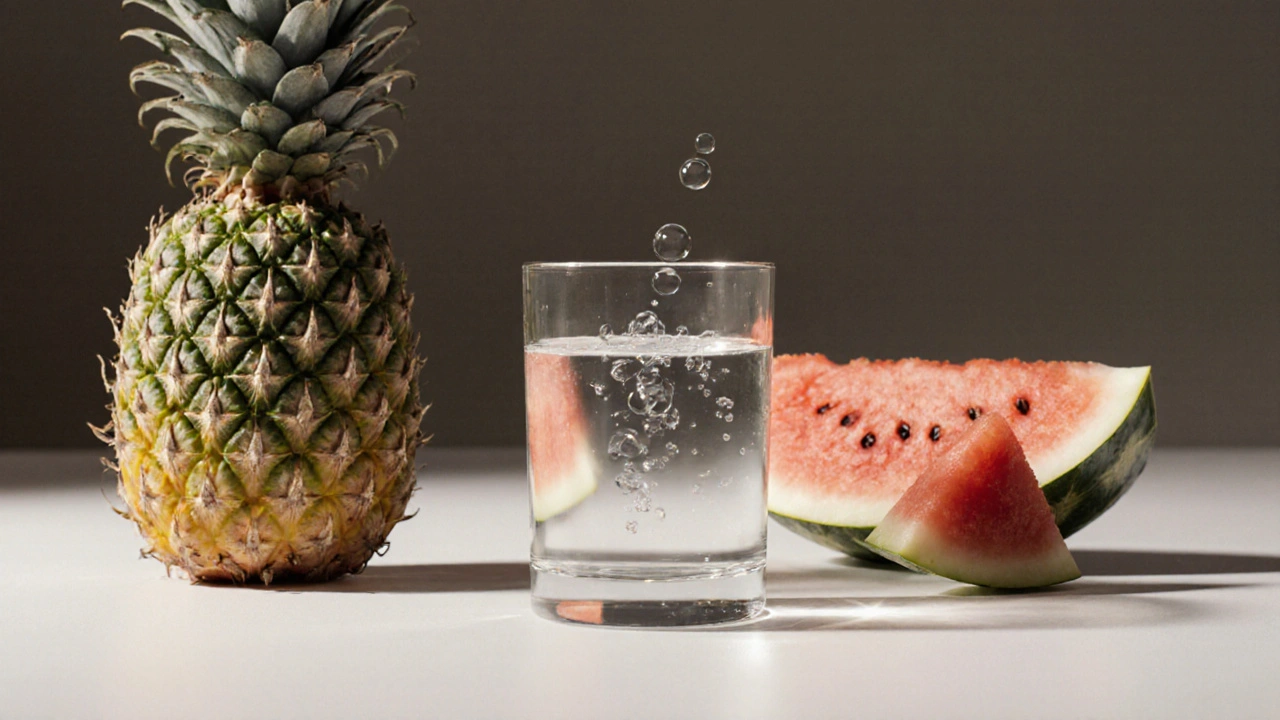Think oral without a condom is risk-free? That's a common myth, but it's just not true. Sure, it might feel more natural or intimate, but skipping protection comes with some real trade-offs you need to know—especially when it comes to sexually transmitted infections.
So, why do people go for it anyway? Some say it boosts the experience or feel closer with their partner. Others just caught up in the heat of the moment. But knowledge is power, and being informed can save you a ton of stress later on.
If you're curious about what's actually at risk, which STIs get passed this way, and how to balance fun with safety, you're in the right place. You’ll find practical advice, facts you won’t hear everywhere, and honest answers to those awkward questions you might be too shy to ask.
- Key Points About Oral Without Condom
- Direct Answer: Is It Safe?
- What Happens During Oral Without Condom
- Risks to Know Before You Go Down
- Tips For Safer (But Still Fun) Oral
- Answering Your Most-Asked Questions
Key Points About Oral Without Condom
There’s a lot of talk about oral sex without a condom, but here’s what actually matters if you want the truth and not just gossip.
- STIs don’t care if it’s oral. Infections like chlamydia, gonorrhea, herpes, syphilis, and even HIV can pass through unprotected oral sex. You might think it’s lower risk than other stuff, but it’s not zero.
- Most people don’t show symptoms at first. You or your partner could have an infection and not know it. That’s how a lot of folks unknowingly spread things around.
- Oral without condom feels more natural to many. But what you gain in sensation, you might pay for with a trip to the clinic later. The risk is real, not just if you’re switching partners often.
- Protection doesn’t kill the mood—surprises later do. There are flavored condoms and dental dams that make things safer without being all medical about it.
- Oral health matters too. Cuts or sores in your mouth (even ones you don’t feel) make it way easier for infections to get through. Brushing your teeth before sex can actually raise the risk, because it can cause tiny gum injuries.
| STI | Risk from Oral Without Condom |
|---|---|
| Chlamydia | Yes |
| Gonorrhea | Yes |
| Syphilis | Yes |
| Herpes | Yes |
| HIV | Low, but possible |
"Oral sex is not risk-free—using a condom or dental dam greatly reduces your chances of catching or spreading STIs." — Centers for Disease Control and Prevention (CDC)
If you’re thinking about skipping the condom, don’t just assume you’ll be fine. The best way to be safe? Know your risks and talk with your partner before things get heated.
Direct Answer: Is It Safe?
So, is oral sex without a condom actually safe? Here’s the honest answer: It’s less risky than sex without a condom, but it’s definitely not risk-free. You can still catch or pass on a bunch of STIs (sexually transmitted infections) through oral contact. The big ones are herpes, gonorrhea, chlamydia, syphilis, and even HIV, though the risk for HIV is lower with oral than with vaginal or anal sex. HPV—yeah, that virus that can cause cancers—is also spread this way.
Let’s get real about what typically happens:
- If your partner has an infection in their mouth or genitals—whether you see symptoms or not—germs can move from one mouth or set of genitals to another quickly.
- Oral sex without a condom is the main way people get oral herpes, and it’s also a way to get gonorrhea in your throat.
- Some infections like HPV or herpes can spread just from skin-to-skin contact, even if there’s no visible rash or sore.
Want some quick numbers? Check this out:
| Infection | Chance of Transmission (%) |
|---|---|
| Herpes (HSV-1/2) | About 10-30% per act (if sores present) |
| Gonorrhea (oral) | 10-20% per act |
| Syphilis | Unknown, but it’s possible |
| HIV | Less than 1% per act (but higher if cuts or bleeding gums are present) |
If you or your partner have sores, cuts, or bleeding gums, the risks go up. Oral without a condom might feel closer or more natural, but it’s playing the odds—sometimes, it’s not worth that gamble, especially with new or multiple partners.
If you’re both tested, in a long-term monogamous relationship, and trust each other, the risk gets smaller. But with casual hookups, there’s no way to be totally sure.
Spoiler: Dental dams and condoms for oral aren’t just dentist props and latex party tricks—they’re legit tools for safe sex and can protect both partners. Bottom line? Yes, people have oral sex without condoms every day, but it’s not "safe," it’s just less risky compared to some other options. Only you can decide what risk is okay for you.
What Happens During Oral Without Condom
When you have oral sex without a condom, there’s direct contact between your mouth and your partner’s genitals or anus. That means you skip the extra protection a condom gives, making it easier for things to pass from one person to another, especially STIs (sexually transmitted infections). You might notice the sensations are different—some people say it feels more natural or intimate. There’s no barrier, so every fluid and skin-to-skin touch gets through.
Here’s what actually gets exchanged during unprotected oral:
- Saliva meets genitals (or anus). This can carry bacteria and viruses.
- Bodily fluids like pre-cum, semen, vaginal fluids, or even traces of blood could enter your mouth—sometimes you won’t even notice.
- Direct skin-to-skin contact. Some infections spread this way, like herpes or HPV.
It’s not just about HIV. Most people worry about that, but actually, infections like gonorrhea, chlamydia, syphilis, herpes, HPV, and even hepatitis can all spread through oral sex without a condom. Gonorrhea and chlamydia can show up in your throat, even if you don’t have any symptoms. Surprising, right?
Here’s a quick look at how common it is for different STIs to get passed through unprotected oral sex:
| STI | Can it be Spread by Oral? | Common Symptoms (If Any) |
|---|---|---|
| Gonorrhea | Yes | Sore throat, no symptoms |
| Chlamydia | Yes | Often no symptoms |
| Herpes | Yes | Mouth sores, genital sores |
| HPV | Yes | Warts, sometimes cancer risks |
| HIV | Rare, but possible | Flu-like (if acute) |
| Syphilis | Yes | Sores, rash |
| Hepatitis A, B, C | Yes | Yellowing skin, fatigue |
What about pleasure? Sure, some people find no condom oral more enjoyable, and that’s a common reason people skip the barrier. Just know what you’re risking and pay attention to signs of infection after. If you or your partner have cuts, sores, or gum disease, your chances of catching something go way up.
Bottom line: ditching the condom for oral isn’t a free pass. If you choose to go that route, being aware of what’s shared and how to spot early symptoms can make a real difference.

Risks to Know Before You Go Down
A lot of people still think oral sex without a condom is basically safe. That’s not the case. The truth? You can still catch or pass along several STIs if you do oral without protection. And we're talking about stuff that’s way more common than most folks realize.
Here’s what you could be exposing yourself (and your partner) to:
- Herpes (HSV-1 and HSV-2): Passed easily either way. Even a “cold sore” is a type of herpes you can get from oral.
- Gonorrhea and Chlamydia: Yeah, these aren’t just down-there STIs—your throat can be infected too. Many people won’t have any symptoms, so you or your partner could have it without a clue.
- Syphilis: It’s on the rise, and it can spread from sores that are sometimes too small to see.
- HPV (human papillomavirus): This one can show up in the mouth and throat. It’s super common, and some types can raise your cancer risk.
- HIV: Lower risk than vaginal or anal sex, but not zero, especially if you have cuts, sores, or bleeding gums.
- Hepatitis A, B, and C: Contact with infected blood or other fluids can spread these, and they can do some real damage to your liver.
Worried you're being too paranoid? The numbers don’t lie. Here’s a quick look at how often some of these STIs are passed through oral sex:
| STI | Chance of Transmission by Oral (Comparative) |
|---|---|
| Herpes | High (if sores are present) |
| Gonorrhea | Moderate to high |
| HPV | Moderate to high |
| HIV | Low, but higher with cuts or sores |
| Syphilis | Moderate |
Also, stuff like bad dental health, gum disease, or even tiny cuts from brushing your teeth can raise your risks. If you’re seeing blood when you spit toothpaste, hold off on oral for a bit.
No one likes unwanted surprises. If you’re planning to go down without a condom, it pays to know your and your partner’s current STI status. Regular testing is key—nothing kills the mood like finding out after the fact, right?
Tips For Safer (But Still Fun) Oral
Being smart about oral sex without a condom doesn’t mean killing the mood. You can keep things hot and still cut down your risk for STIs and other issues. Here’s how to make safety part of your routine without turning things clinical.
- Get Tested Regularly: Both you and your partner should know your status. Regular STI screenings (about every 3-6 months if you’re sexually active with multiple partners) keep surprises out of the bedroom.
- Use Dental Dams or Condoms: If you want to lower the risk even more but don’t love condoms, dental dams are thin latex or polyurethane sheets that act as barriers during oral on vulva or anus. Not everyone loves the feel, but they’re a legit tool for safer fun.
- Avoid Oral Right After Dental Work: Open cuts or sores in your mouth make it easier for infections to slip through. Wait for any mouth wounds to heal before going there.
- Skip it During Outbreaks: If you or your partner have any signs of infection (like herpes sores, cold sores, warts, bumps, or weird discharge), pause on oral until you get things checked out.
- Keep Good Hygiene: Clean hands, mouths, and private parts lower your exposure to bacteria and viruses. Quick rinse or a shower before getting busy can be a game-changer.
- Consider Vaccines: The HPV vaccine and hepatitis B vaccine don’t just protect against serious diseases—they lower your odds of picking up these viruses from oral sex.
Not sure which infections can spread this way? Here’s a clear look:
| Type of Infection | Can Oral Sex Transmit? |
|---|---|
| Herpes (HSV-1, HSV-2) | Yes |
| HPV | Yes |
| Gonorrhea | Yes |
| Chlamydia | Rare, but possible |
| Syphilis | Yes |
| HIV | Very low, but possible especially with mouth sores/bleeding gums |
If you want fun without the stress, talk openly with your partners, stay up-to-date on health checks, and use the tools that fit your vibe. There’s no one ‘right’ way—just the way that keeps you comfortable and healthy.
Answering Your Most-Asked Questions
You’ve got questions—I hear them all the time. Let’s clear up the most common stuff people want to know about oral sex without a condom so you’re not left guessing.
Is oral without a condom totally safe? No, it’s not. There’s still a real risk of picking up STIs (sexually transmitted infections), including gonorrhea, chlamydia, herpes, HPV, and syphilis. Some can be passed even if there are no symptoms. HPV alone is insanely common—even the CDC says most sexually active folks get it at some point.
What are my chances of getting an STI this way? Risk depends on what you and your partner might have and the type of oral sex. For example, giving oral to a man (fellatio) carries a different risk profile than giving to a woman (cunnilingus). Here’s a quick look at how some common infections pass through oral sex without a condom:
| Infection | Passed by Oral? | Notes |
|---|---|---|
| Gonorrhea | Yes | Very easily passed both ways |
| Chlamydia | Yes | Can infect throat/genitals |
| Herpes (HSV-1/2) | Yes | Possible even with no sores |
| Syphilis | Yes | Small sores often go unnoticed |
| HPV | Yes | Linked to some throat cancers |
| HIV | Very low | Low risk, but possible |
Can you get pregnant from unprotected oral? Straight answer: no, pregnancy isn’t a concern from giving or receiving oral sex. That’s one less thing to worry about.
What if my partner looks healthy? Here’s the deal: looks can seriously deceive. Many STIs show zero signs, so don’t rely on appearances.
Are there ways to make oral safer? Yes, thankfully. Dental dams, flavored or regular condoms, and getting tested together are your best friends. Also, avoid oral if you or your partner have any sores or cuts in the mouth—open wounds make it easier for infections to get in.
- Use a new condom or dental dam every time.
- Cut open a regular condom if you don’t have a dental dam.
- Don’t brush or floss right before oral—the tiny cuts let germs in more easily.
How often should I get tested? If you’re having unprotected oral sex without a condom, at least once a year is smart. If you have multiple partners or notice any symptoms (sore throat, weird bumps, discharge), get checked sooner.
If something still feels fuzzy, talk to your doctor—they’ve heard it all. Better safe than sorry.









